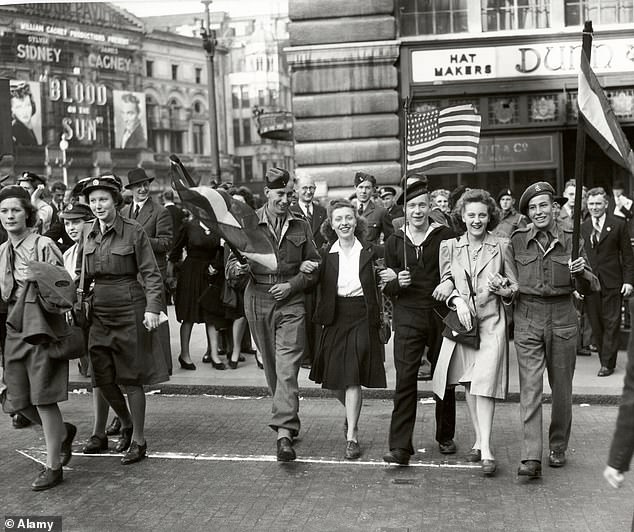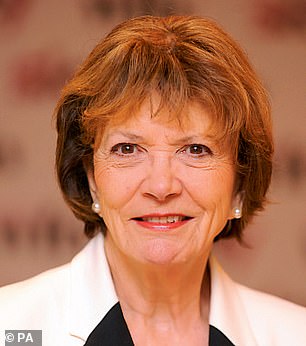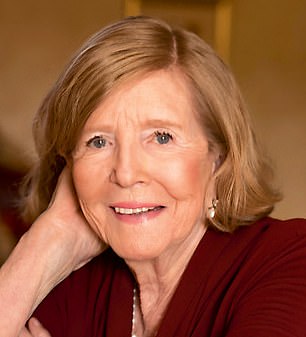‘People did the conga down the Mall and went crazy’

By John Standing, 90
I was ten and at prep school when the war in Europe officially ended on 8 May 1945. I remember the entire school being gathered in the dining room to hear a special announcement the day before. We listened to the news on the radio as Prime Minister Winston Churchill declared victory. Although the news was monumental, the dining room celebrated with a typically reserved British reaction of a rousing three cheers before going back to our desks.
During the war, parts of it were obviously thrilling to a child. My father was stationed in Totteridge with his battalion, the King’s Royal Rifle Corps. When the sirens went off, we would all be herded into an Anderson shelter, which I clearly remember was covered in orange nasturtiums. We knew the Germans were coming and I think I felt both fear and excitement.
If my brother and I were in London with our mother (actress Kay Hammond), we had to go to the basement of the building where we lived to take shelter. Sometimes the air-raid sirens went off in the middle of the night and we’d be in our pyjamas, the only children among about ten adults. Everyone was as quiet as they could possibly be and would try to go back to sleep in these wicker chairs that had footrests. What I remember most was the smell of old people crammed into a smallish space.
The VE Day celebrations were a different matter entirely. I think the reason it’s all still relatively fresh in my mind is that it was a massive adventure. My mother’s brother, Michael Standing, was my hero. I was mad for cricket – still am – and before the war he and Brian Johnson were the first cricket commentators for the BBC. Because of that job he was given a solo programme on the radio during the war called Standing on the Corner, where he would stop ordinary people on the street going about their lives and talk to them. Very gentle, inoffensive stuff.
He asked me if I’d like to accompany him on VE Day to Green Park, where he was going to broadcast a special edition of his radio show. I was just thrilled to be spending time with my uncle and had no inkling I was going to witness history in the making and, what’s more, have a ringside seat. Actually, this particular show was broadcast from a specially built elevated box on the edge of the park, so that we could see over the crowds.

Celebrating the end of the war in Europe, Piccadilly Circus, London, 8 May 1945
I’d never seen as many people in my life. It was like a vast sea of moving people: small children carried high on shoulders, Union Jacks being waved, men climbing up lampposts and just an overwhelming mood of happiness and unbridled joy. I had a bird’s-eye view of the balcony at Buckingham Palace, and I remember being on that platform for hours and hours and hours. The cheering. The cheering was deafening. ‘We want the King! We want the King! We want the King!’
Finally, King George VI, the Queen, Princess Elizabeth and Princess Margaret Rose appeared with Winston Churchill and the crowds went crazy.
I couldn’t understand why Princess Elizabeth was dressed like a soldier – she was wearing her uniform from the Auxiliary Territorial Service, where she trained as a driver and mechanic. I subsequently learned it was because she and her sister wanted to join the crowds afterwards and celebrate, unnoticed, with Elizabeth’s future subjects. It really confused me, though.
My standout moment from that day, however, was a fabulously drunken sailor playing the trombone beneath Uncle Michael’s box. He would play for a few seconds and then be violently sick, before continuing blowing his instrument. I’ve never forgotten him. I was mesmerised in the way that only a ten-year-old boy can be. Transfixed. Fascinated. The celebrations went on all night. People did the conga down the Mall and really went crazy with happiness at the thought of the war ending.
This Thursday, as I approach my 91st birthday, I shall watch commemorative programmes on television – virtually no one owned one in 1945, certainly no one I knew – and hope beyond hope that we have learnt from the past. I pray my children and grandchildren never have to experience a world war. To quote Churchill from his VE Day broadcast all those years ago, ‘Long live the cause of freedom.’ We must never forget.
‘We joined hands and skipped around a floodlit tram’

By Joan Bakewell, 92
Black: the world had been black. The only outdoor lights I knew had been the glow of Manchester burning during the Blitz of August 1940, seen from our back garden in Hazel Grove, south of Stockport, me held aloft in my father’s arms. Domestic chinks of light from indoors were strictly policed by blackout curtains draped or fitted at windows, lest the lights offer guidance to German bombers overhead. Wardens patrolled the streets and knocked on the door of any house showing beams. Cinemas were marooned in gloom; we found our way there with small, pencil-thin torches held low, again for fear of alerting those same bombers. So light came as a shock.
The arrival of street and shop lights at the end of the war was as thrilling as a fairground. I was six when the war broke out, so had seen nothing like them. I couldn’t believe that shops were allowed to leave their lights on overnight. What about bombs? What about saving electricity? To a small child schooled in austerity this was extravagance indeed.
And then came the VE Day celebrations. By now I was 12. We thought of it not just as the end of the war but as the end of all war. It merely remained for the Americans to mop up hostilities against the Japanese in Panama… not our business!
Stockport did us proud, kitting out a municipal tram with all-over illuminations and sending it along the tracks to each terminal with just the driver on board. Ours ended at the Rising Sun pub at Hazel Grove. It had been greeted proudly along the way, but at the terminal the entire youth club from the local church – there were lots of us in those days – turned out, joined hands and skipped round the floodlit tram.
I was dizzy with excitement. Not only was all war over for good, but I was joining groups my own age who would become friends for years.
Early teenage yearnings were not just confined to victory in war: now I had permission, sanctioned by parents and schools, to celebrate with boys and girls of my own generation. New possibilities loomed. It was more than the end of war I was celebrating!
‘Instead of powdered egg we celebrated with chicken for lunch’

By Anne Glenconner, 92
I was 12 years old on VE Day and at a girls’ boarding school called Downham in Bishop’s Stortford. We had lessons of some sort in the morning and were allowed to read a book of our choice. We knew we were to meet in the assembly hall at 12 o’clock and that was when our teachers, Miss Graham and Mrs Crawford, told us the war was over. There were 200 or so students; we absolutely erupted.
The great thing was we weren’t punished. Normally, you had to behave very well indeed. If you met a teacher, or any of the ‘parlour’ – the head girl and the girls in charge – you had to stop and stand with your back to the wall as they passed. But not on VE Day. Everyone was so happy the rules went out of the window.
Before then, and because of rationing, school food had been horrible – powdered egg and grey bread. Everyone had thought the war was going to end quite soon so, in time for VE Day, the teachers ordered chicken as a treat for lunch. I had a chicken leg for the first time in four years. They also baked a cake, iced with red, white and blue stripes, which we washed down with blackcurrant juice.
Afterwards, the teachers handed out Union Jacks and we had a garden party in the school grounds – waving our flags, jumping, running three-legged races and playing hide and seek. It was fantastic.
That night, though, after all the excitement, I remember feeling sad. A lot of us did. So many girls had lost their fathers, uncles or brothers. My uncle and godfather, David Coke, was a Battle of Britain pilot who was shot down and was later killed in action in Libya in 1941. Our dorms slept eight, and I can remember lying in bed and hearing the girls snuffling; we were thinking of all the people we’d lost.
After VE Day, I thought everything would change overnight. But, of course, it didn’t. There was still rationing, and my father was stationed with the British Army in Vienna, so I didn’t see my parents except for the Christmas holidays. The only difference I remember was there was no blackout. We no longer had to keep our curtains closed, so we could, finally, look outside at night and see the moon and the stars.
Lady Glenconner’s Picnic Papers will be out in paperback on 3 July (Bedford Square, £10.99). To pre-order for £9.34 until 18 May, go to mailshop.co.uk/books or call 020 3176 2937. Free delivery on orders over £25.
pa images, harry cory wright






